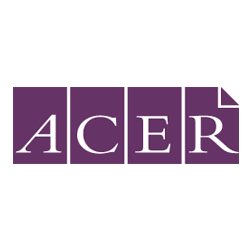
Student engagement at New Zealand Institutes of Technology and Polytechnics
Status
Completed: 1 June 2011
Project Details
A project completed in 2011, undertaken by the Australian Council for Educational Research, to measure student engagement at New Zealand Institutes of Technology and Polytechnics (ITPs) using the Australasian Survey of Student Engagement (AUSSE), which provides data which tertiary institutions throughout New Zealand and Australia can use to attract, engage and retain their students.
Aims:
The main aims of the project were to:
- provide data which tertiary institutions throughout New Zealand and Australia can use to attract, engage and retain their students
- investigate how students perceive their educational experience during tertiary study and how they interact with the opportunities provided
- identify how students are learning and the outcomes they are achieving, which will allow tertiary education institutions to understand what really counts in terms of quality.
Methodology:
The project's methodology involved:
- administering the Student Engagement Questionnaire (SEQ) to a representative sample of students at ten ITPs throughout New Zealand
- providing the survey in online or paper form
- providing the same SEQ content to all students
- managing and reducing levels of item-level non-response by randomly distributing one of three different online versions, each containing different rotating orderings of items.
Team

Ali Radloff
Research Fellow
Australian Council for Educational ResearchStatus
Funding
$50,000.00 (excl GST)
Key Findings
The key findings from the project included:
- Overall, most students were satisfied with their experience at their institution. They rated the overall quality of academic advising at their institution as ‘good’ or ‘excellent’ and rated their overall educational experience positively. The majority of students said that they would ‘probably’ or ‘definitely’ attend the same institution again if they had the chance to start over.
- Diploma level ITP students scored significantly higher on the career readiness scale than students studying for other types of qualifications. Most ITP students also reported some involvement in activities that help them prepare for their future careers, and reported slightly higher levels of career readiness than students at New Zealand universities.
- An area of overall concern for ITPs is the high number of students who report that they have seriously considered discontinuing their current studies and leaving before completing their studies. The rates are much higher among ITP students than among New Zealand university students. In many areas, however, ITPs seem to be doing a good job of supporting uncertain learners. For example, overall satisfaction rates for students on bridging programmes are particularly high.
- At the request of the sector, two unique questions were included on the ITP AUSSE survey instrument. These asked students about the extent to which their experience at their institution contributed to ‘developing a greater understanding of the Treaty of Waitangi’ and ‘contributing to living in a sustainable way’. These questions were included because many polytechnics felt that they reflected some of the values their institutions hold. Given this context, results were somewhat disappointing. Over half of all ITP students stated that their experience at their institution had helped them ‘very little’ to develop a greater understanding of the Treaty of Waitangi. Similarly, just under half of students reported that their experience had been of ‘very little’ help in contributing to living sustainably.
- The AUSSE provides the opportunity to begin to compare the reported behaviours and perceptions of students studying at degree level at both ITPs and universities. There are many more similarities than differences between the two groups of students. Bachelor degree students studying at ITPs were found to be similarly engaged with academically challenging activities, active forms of learning such as making presentations and contributing to class discussions as degree students in universities in New Zealand, Australia and South Africa. These scale scores were all significantly lower than for US university students, however.
- ITP students reported somewhat higher levels of staff student interactions than those in universities and similar overall levels of support (although first year students in ITPs identified a more supportive learning environment than their counterparts in universities). As might be expected, because of the nature of the programmes offered at ITPs, bachelor level students at ITPs are significantly more involved in work integrated learning activities than university students in New Zealand. Overall satisfaction rates for the two groups of students were relatively high, but significantly higher among university students.
Key Recommendations
The key recommendations from the project were:
Students’ high departure intentions | Of vital importance are the findings relating to students’ high departure intentions at ITPs. Students studying at ITPs report much higher intentions to leave before completing their qualification and to discontinue their studies. Action needs to be taken to reduce the numbers of students in New Zealand’s tertiary education system who begin studies but leave without completing their qualification. Engaging these students in study and providing them with support throughout their study is vital to retaining students in tertiary education and ensuring that students leave tertiary education with better skills ready to contribute to New Zealand’s economy.
Collecting and sharing information on students’ engagement | Taken together the findings from the ITP pilot of the AUSSE provide a better understanding of what students studying at ITPs are actually doing and helps institutions identify where improvements could be made. The results reported throughout this report, in particular the level of departure intentions among students at ITPs, show that more needs to be done to improve student retention and success at ITPs. By collecting and sharing information on students’ engagement and outcomes, we gain a better understanding of what students are doing helping us to make positive change and enhance the quality of tertiary education for all in New Zealand.
A report prepared by Ali Radloff.
ISBN 978-0-473-19145-0 (print)
ISBN 978-0-473-19146-7 (online).
(PDF, 1.74MB, 38-pages).
- 1 June 2011